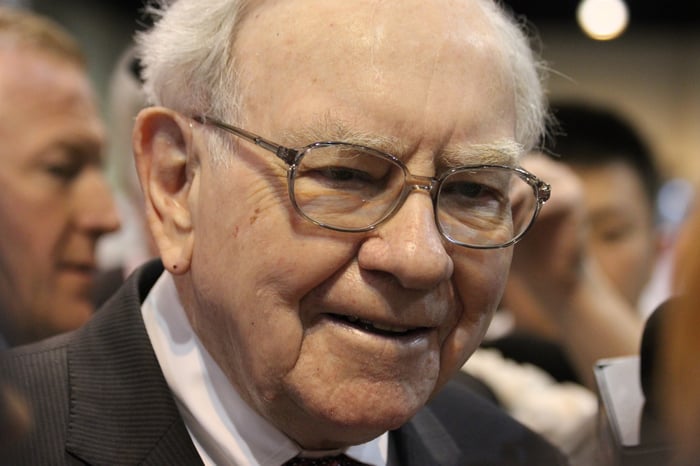Warren Buffett is considered a stock market legend because he has steered Berkshire Hathaway (BRK.A -2.66%) (BRK.B 0.41%) to mind-blowing returns in the six decades he has been at the helm.
Since 1965, the investment vehicle has generated roughly a 3,600,000% return for investors, or an average of more than 20% annually. In contrast, the S&P 500 has generated about a 30,000% return, or an average of 10% a year. There's a reason Buffett is called the Oracle of Omaha.

Image source: The Motley Fool.
Buffett has tried to share with the public his investment philosophy in broad terms over the years, such as buying good companies at a discount and holding on to them for years. In general it serves investors well, but there is much left unsaid in the details. He enjoys special privileges as a billionaire investor that are unavailable to the average investor, and Buffett doesn't always follow his own advice.
Still, following his general principles can help your own returns. Recently, Buffett bought more shares in Celanese (CE 0.80%), a global chemicals company that he first began acquiring earlier this year. So let's see if following his lead in this stock is a worthwhile purchase for your own portfolio.
NYSE: CE
Key Data Points
Finding the right chemistry
Buffett purchased his first tranche of Celanese stock in the first quarter, spending $1.1 billion to acquire some 7.9 million shares, back when it was trading north of $140 a share. He added more shares in the second quarter, and again in the third, so that Berkshire Hathaway now holds 9.71 million shares, or 9% of Celanese's outstanding shares, which are worth just over $1 billion.
Needless to say, with Celanese trading at around $104 per share today, you would be able to buy the stock for prices lower than what Buffett paid himself. Would you want to, though?
Celanese primarily makes polymers, acetyls, and acetates, or plastic and plastic-like materials. For example, polyoxymethylene, or POM, is one of its key products and is a thermoplastic used in precision parts often in the automotive industry for fuel systems and window lift parts. It's also used for conveyor belts, sprinkler systems, and drug delivery systems, as well as for gears like those you would find in large and small appliances in the home.
The chemical company also makes acesulfame potassium, or Ace-K, an artificial sweetener, and the preservatives potassium sorbate and sorbic acid, which are found in food, beverages, and personal products.

Image source: Getty Images.
A good value
What Buffett probably likes about this stock is that aside from being an industry leader in the space, it's attractively valued. While chemical companies aren't typically known for nosebleed valuations, compared to most of its peers, Celanese is trading at a discount.
|
Stock |
Price/Equity Ratio |
Forward P/E Ratio |
Price/Sales Ratio |
Price/Free Cash Flow Ratio |
|---|---|---|---|---|
|
BASF |
8.9 |
10.8 |
0.5 |
N/A |
|
Celanese |
6.9 |
7.9 |
1.2 |
11.0 |
|
Dow |
6.7 |
11.7 |
0.6 |
5.0 |
|
DuPont |
31.4 |
18.8 |
2.5 |
62.7 |
|
Eastman Chemical |
9.6 |
10.5 |
0.9 |
572.4 |
|
ExxonMobil |
9.3 |
10.0 |
1.2 |
10.6 |
Data source: Finviz.com. Yahoo! Finance.
Celanese doesn't have a lot of large competitors because of the high barriers to entry in the market, and its products are essential to key industries. It also just completed its acquisition of DuPont's mobility and materials segment that services the automotive industry. This is likely in order to make a play for a bigger part of the electric vehicle market in which it has already invested heavily.
Buffett continues to dump shares in China's EV maker BYD and may think it's better to invest in a pick-and-shovel materials business that plays to the whole field rather than trying to find the one horse that will win. Celanese is an overall stable business with a long runway of future growth before it that possesses relatively low risk.
A healthy stream of income
Buffett doesn't buy stocks because they pay a dividend, but certainly enjoys the income they provide when they do. Celanese has paid a dividend for the past 17 years and has hiked the payout every year since 2010, most recently last month when it raised the quarterly rate 3% to $0.70 per share. The dividend yields a healthy 2.7% annually and with a payout ratio of just 18.5%, the dividend is both safe and has plenty of room for future increases.
Blindly following an investor's stock purchases is not a wise strategy, even if it's someone like Warren Buffett. But Celanese looks like a chemicals stock worth owning. Getting a lifetime of passive income at a price cheaper than what Buffett paid makes the stock opportunity all that much sweeter.




